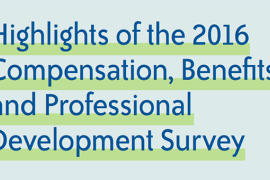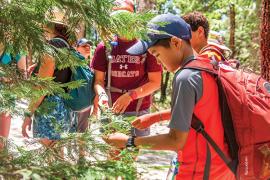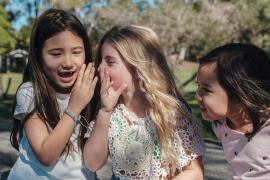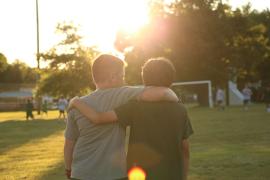Imagine a world where everyone knows about the value of the camp experience. Where camp is universally considered an essential part of human development. Where every parent, grandparent, and guardian sees camp as the go-to solution to social issues. What if camp was the app? Is your child having problems learning to get along with others? There's a camp for that. Need to find a way to help your child build self-confidence? There's a camp for that. Want to help your child build 21st-century skills? There's a camp for that. Is your child suffering from stress? The answer is camp. Those of us who have drunk the Kool-Aid are saying, "Well, of course the answer is camp!" in a hello-captain-obvious fashion.
But to those outside of the camp experience, it's not that obvious. While collectively camp staff and operators have a zillion feel-good camp stories and share a cult-like, "we are awesome" energy, as an industry we have not yet found a way to universally convert our kumbaya moments in ways that resonate with the broader public and communities, and increase market outreach to prospective camp participants from diverse populations.
I once read something in relation to camp that captures the essence of this challenge: "From the outside looking in, you can't understand it. From the inside looking out, you can't explain it" (author unknown). No wonder we have a marketing problem. For those working in camp, or who have personally been a product of the camp experience, we just "get it." As camp staff and operators, we observe behavior changes and personal growth, which is often dynamic. We see kids make friends, overcome challenges, become inspired, and find their authentic selves. We know deeply in our hearts and souls that this is powerful, life-changing stuff.
But how do we really know? Research.
Research has demonstrated that camp promotes mental wellness. Research shows that camp is the antidote to summer sedentary behaviors. Research has proven that camp builds nonacademic competencies/ skills that support school/life success. Research has proven that camp contributes to positive individual development. Research affirms that what we think we know about the benefits of camp is really true. Camp-related research provides us with solid, proven information that we can actually use to explain camp to those outside of the experience.
What if camp research is the silver bullet to camp marketing?
Research and Resonating
No matter how warm and fuzzy the mission statement, economic realities dictate camps must provide programs that produce outcomes that resonate with parents/ customers. What are their children going to gain from the experience? Why should they spend their money at your camp? Why should they even consider camp in the first place?
Many of the answers to these marketing quandaries do indeed lie in camp-related research. By repackaging this research, we can promote solutions to social issues that parents see as relevant to their children's development — and in which they are willing to make economic investments.
From a bottom-line perspective, utilizing camp-related research as a marketing tool to fill camp beds and buses makes solid economic sense for operators. To make this happen, the camp industry must be able to connect research, advocacy for the camp experience, and camp marketing efforts to clearly and easily communicate the value of the camp experience to a broad audience.
Further, for research to be economically relevant directly for individual camps, camp operators must be able to present research information in ways that specifically resonate with parents/families — including youth and families who have not attended camp before.
By utilizing ACA's camp research, every camp has the capacity to construct and customize key marketing messages based on evidence. Proof above and beyond personal feelings, opinions, or otherwise influenced by our subjective passion for the camp experience.
Proving There's a Camp for That
By spotlighting social issues that have well-researched outcomes as a result of the camp experience, we can market camp as the solution in user-friendly ways that are meaningful to prospective parents and camper families. Parents are often already aware that their child has a social or developmental need to be able to make friends or development competence in a particular arena, for example. We just need to definitively show them that camp is where they should look for the solution. There is a camp for that.
While ACA's camp research efforts are ongoing, there is already a considerable amount of research information available that camps can use for their marketing efforts now. Following is a summary of some of that research and ways you might apply it to issues that are important to prospective camp families:
|
Issue
Are you interested in promoting mental, emotional, and social health in kids?
What the research says
Research tells us that the key ingredients to children's mental health are access to caring adults and positive routines and practices (Murphy, Stratford, Gooze, Bringewatt, Cooper, Carney, & Rojas, 2014), both of which are common features of many camp experiences (Garst, Browne, & Bialeschki, 2011). One of the biggest known benefits of the camp experience is that kids gain social skills (Thurber, Scanlin, Schueler, & Henderson, 2007), which equips them to build and maintain healthy peer relationships at camp and beyond. Additionally, camp promotes self-confidence and personal development (Glover, Mock, Mannell, & Fine, 2014), and positive identity, spiritual growth, and values (Thurber, Scanlin, Schueler, & Henderson, 2007). Social skills, character outcomes, and spiritual/moral outcomes are among the most common goals in camp programming: 93 percent of camps intentionally target one or more of these outcome areas in their programming.
How you can use this
This can be a powerful part of your marketing message to parents who are concerned about the impact of stress on their children's health. You can also use this research to help your staff understand how they can play a critical role in fostering mental health.
|
|
Issue
Do you need to remind your stakeholders that camp is a great place for kids to get tons of physical activity?
What the research says
Camp can be an "immersion in wellness" that increases campers' understanding of healthy eating (Beckley & Litchfield, 2014) and improves their attitudes toward physical activity (Glover, Mock, Mannell, & Fine, 2014). While at camp, campers engage in physical activity (Hickerson & Henderson, 2012), which is why kids who attend camp in the summer are less likely to become obese (Mahoney, 2011). A new study even shows how increasing physical activity can be a fun, game-like aspect of camp (Wilson, Sibthorp, Fraughton, & Brusseau, 2016). Our own camp data tells us that over 80 percent of camps offer healthy snacks, 70 percent offer a salad bar, and nearly 60 percent incorporate whole grains into camp meals. Sixty-three percent of camps report that their campers engage in one to five hours of intense physical activity each day.
How you can use this
Physical activity is a natural part of many camp environments, which makes it an ideal way to connect with schools and other organizations interested in increasing physical activity and overall wellness in kids. Parents are also looking for ways for their kids to be more active, so use this research to remind your camp families that physical activity is a guaranteed benefits of attending camp.
|
|
Issue
Do your campers spend a lot of time in the outdoors but you need a way to show the value in connecting kids to nature?
What the research says
Whether a camp is located in an outdoor setting or engages kids in the outdoors through their programming, research tells us that camp promotes environmental awareness (Glover, Mock, Mannell, & Fine, 2014) and overall connections to nature (Browne, Garst, & Bialeschki, 2011). Camps also increase kids' desire to spend more time outdoors (Baker, Morgan, & Santurri, 2016). These are valuable outcomes because time spent outdoors promotes stress relief, cognitive skills, and mental health in children (Friedman & Loria, 2014) while offsetting other negative effects of nature deficit disorder (Louv, 2005). Seventy-seven percent of camps offer environmental activities, such as environmental ethics, recycling, and earth science.
How you can use this
Camp is the ideal context for connecting kids to nature, not only because many camps are located in the outdoors, but camps are also safe and they design programs specifically to help kids have positive, memorable experiences outside.
|
|
Issue
Do you need to convince your parents that sending their kids to camp will prepare them for college and their career?
What the research says
Camp promotes noncognitive/metacognitive skills (Ozier, 2014) and 21st-century skills, such as teamwork (Roark, Gillard, & Blauer, 2013; Henderson, 2012), creativity (Lynch, Hegerty, Trauntvein, & Plucker, 2015), problem-solving, confidence, and responsibility. Intra- and interpersonal skills are more critical than technical skills in today's job market (Berger, 2016), which is why camp is increasingly recognized as an ideal way to prepare kids for college (Tate, 2016). Camp industry data suggests that 23 percent of camps offer some sort of STEM programming, and is a program area many camps are considering adding in the future; 48 percent of camps have some sort of relationship with schools or school-based curricula; and 75 percent of camps design programs that intentionally target 21st-century skills such as resilience, problem solving, and critical thinking.
How you can use this
Competition for kids' summertime hours is fierce, so use this research to convince prospective families that camp is time and money well spent. This information can also be used to form connections with schools or other school-based programs. With the new Every Student Succeeds Act, many school districts are now required to target noncognitive skills alongside traditional academic outcomes, which means there may be increased funding to support camp-school partnerships.
|
|
Issue
Does your camp serve youth with disabilities, illness, or special needs?
What the research says
There is actually more research showing the benefit of specialized camps for kids with disabilities, illness, or other special needs than research on nonspecialized camps (Browne & Gillard, 2013). Just a few examples of findings include: Camp promotes resilience in kids with serious illness (Graber, Tominey, Southwick, & Mayes, 2015), as well as appreciation, possibility, and friendship skills (Gillard & Roark, 2015); illness management among youth living with HIV (Hiller, Ngo, & Novotny, 2015); social skills for campers with Tourette syndrome (Griswold, 2014); feelings of social acceptance, friendships, and competence among campers at disability-specific camps (Devine, Dawson, & Piatt, 2014); close relationships among military youth (Ferrari & Dybdahl, 2016), and overall positive youth development among populations with demonstrated need, regardless of specific diagnosis (Hall, Kropp, Peden, & Mathews, 2016). Camp data indicates that 41 percent of all camps (specialized and nonspecialized) offer adaptive programs or services for youth with specific needs.
How you can use this
This is another area where camp naturally excels. If your camp serves youth with disabilities, illness, or other special needs, then use this research in your grant applications and to form partnerships with other organizations that serve a similar population, including medical groups.
|
|
Issue
Are you trying to recruit the best staff?
What the research says
Research tells us that camp is as beneficial for staff as it is for their campers. Working at camp is a "high impact practice" for college students, meaning it is a place where they become deeply engaged in their learning (Browne & Heiser, 2015). People who have worked at camp also say that it prepared them to enter the workforce (Duerden et al., 2014) and was a personally transformative experience (Garst, Franz, Baughman, Smith, & Peters, 2009). It is not surprising that many people who have worked at camp say it was the best job they ever had (Whitacre & Farmer, 2013).
How you can use this
Use this research to convince potential staff that working at camp is the best thing they can do to prepare for their career (Brown, 2011). You might also use this research to partner with colleges or universities, many of which are looking for ways to engage college students in out-ofclassroom learning experiences that will prepare them for life beyond college.
|
|
Issue
Do you think that kids need access to caring adults in their lives?
What the research says
Caring adults, particularly those outside of a kid's immediate family, help build up children's "wellness reserves" and are the critical ingredient to successful positive youth development programs (Moore, 2016, and Bowers, Johnson, Warren, Tirrell, & Lerner, 2015). At camp, we know that caring and supportive adults help promote positive youth development outcomes (Roark, Ellis, Wells, & Gillard, 2010, and Garst & Gagnon, 2016).
How you can use this
This research is another great tool for recruiting staff, particularly those interested in someday entering a youth-oriented profession, such as education. Also, use this with parents, especially to combat concerns parents might have about their child's healthy interactions with adults outside of their family.
|
|
Issue
Do you want to spotlight how camp is a great place for kids to play and take appropriate risks?
What the research says
Active outdoor play— particularly self-directed play — is critical for healthy development (Tremblay et al., 2015 and University of British Columbia, 2015), which is why many schools are trying to make play a more important part of kids' school day (Dickey, Castle, & Pryor, 2016). Camp has always been a place where kids can play, but it is an especially great context for play because caring adults and positive peer cultures provide emotional safety (Henderson, 2012), which is necessary for appropriate risk taking. ACA's most recent Emerging Issues Survey found that 71 percent of camps believe that unstructured time is an important part of their camp schedule, and 24 percent of camps include one to two hours of unstructured time per day.
How you can use this
Use this research to address issues of "overparenting" (Garst & Gagnon, 2015) by showing parents the importance of unstructured play and appropriate risk taking.
|
|
Issue
Want to communicate how your camp engages kids in local and global citizenship?
What the research says
Camp promotes cultural identity and encourages kids to work toward peace and equity, accept personal responsibility, work collectively while respecting diversity, and recognize world views while respecting the cultural heritage of others (Fine, Bialeschki, & Bennett, 2014). One out of ten camps hosts international campers, and many camps hire international staff. To promote local citizenship, 44 percent of camps intentionally target outcomes such as youth voice, community service, and civic engagement in their programs. Research shows that one example of a civic engagement program effectively increases campers' interest in becoming involved in their communities (Mainieri, 2014).
How you can use this
Community engagement and service are now more than ever critical for healthy, thriving communities, as well as for college acceptance. Use this research to show that camp has impacts beyond its own walls and prepares youth to be active contributors in their communities.
|
|
Issue
Do you need to convince your stakeholders that camp can support kids' academic achievement?
What the research says
Educators are now realizing that kids' personal health and happiness sets the stage for academic achievement. One recent study found that noncognitive development programs (e.g., mindfulness programs, service learning, social and emotional learning programs) improve student outcomes — academic performance and positive social behavior — and lessen conduct problems and emotional distress (Schanzenbach, Nunn, Bauer, Mumford, & Breitwieser, 2016). Summer programs can offset summer learning loss (Sloan McCombs et al., 2011), and camps in particular are known to build campers' thinking skills (Thurber, Scanlin, Schueler, & Henderson, 2007), which makes camp an environment for "expanded learning" (Browne & Gillard, 2013).
Camp industry research tells us that 24 percent of camps today intentionally target academic skills (math, science, literacy, etc.) in their programming. For example, camp-based reading programs have been shown to improve kids' interest in reading following 30 minutes of reading per day at camp (Arend & Rogers, 2013, and Garst & Ozier, 2015).
How you can use this
This research provides another great link with parents and potential school partners. It can also be used in staff training to engage staff in thinking about facilitating camp activities that can support kids during the school year.
|
Laurie Browne, PhD, recently joined the Research Team at ACA. She specializes in ACA's Youth Outcomes Battery and supporting camps in their research and evaluation efforts. Prior to joining ACA, Laurie was an assistant professor in the Department of Recreation, Hospitality, and Parks Management at California State University–Chico. Laurie received her PhD from the University of Utah, where she studied youth development and research methods.
Diane Tyrrell, CCD, MA Ed, is a former member of ACA's National Board of Directors, served as a member of the ACA 20/20 Strategic Planning Task Force, and is the volunteer editor for Camping Magazine's 20/20 Toolbox Article Series. She has written numerous articles for Camping Magazine and is the author of the book 101 Games and Activities for Canoes and Kayaks. Diane is CEO of Frog Pond Consulting, working with camps.
Photo courtesy of Yosemite Sierra Summer Camp, San Clemente, California.
The views and opinions expressed by contributors are their own and do not necessarily reflect the views of the American Camp Association or ACA employees.




